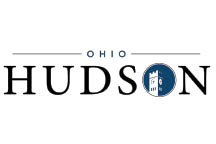Absences force meeting shutdown, postpone censure response
by Judy Stringer
Dec. 20 city council meeting
Hudson Mayor Jeff Anzevino attempted to adjourn the Hudson City Council meeting less than three minutes in, citing the lack of a quorum amidst boos and taunts in a packed Town Hall chamber. At the 7:30 p.m. start time, the seats of President Chris Foster and council members Beth Bigham, Chris Banweg, Skylar Sutton and Karen Heater remained empty.
Responding to the crowd’s insistence that Anzevino did not have the authority to adjourn a meeting without a council vote, however, the mayor, City Solicitor Marshal Pitchford, and the two council members in attendance, Kate Schlademan and Nicole Kowalski, recessed instead.
When they reconvened just before 8 p.m., Schlademan said “it does not seem mandatory that we need to go forward with the meeting due to council members being out of town” nor could they “compel” the missing council members to show up.
“I wish I had a different answer for you all. I wish we had heard public comments this evening,” she said. “We’ve had an unfortunate situation. I could use a lot of different words for it that I cannot actually say at this moment.”
Schlademan motioned to adjourn the meeting, Kowalski seconded, and both voted in favor of adjournment.
Dec. 6 fallout
The absence of five council members was as unexpected as the event that prompted dozens of people to attend the Dec. 20 meeting in the first place. Two weeks before, the same five council members voted to censure Kowalski after Foster produced nearly 50 pages of documents – mostly emails – building a case against her.
The censure was not on the Dec. 6 agenda, and members of council had not seen the documents before that meeting. They did take a brief recess to review the materials before voting, 5-1, in favor of the censure. Schlademan voted against it. Kowalski was excluded from voting.
Foster’s motion to censure Kowalski stated that she did not fully inform council of her intent related to legislative activity, misappropriated funds for political purposes and attempted to “bind council as a body by trying to bring this prosecutorial item beyond the bounds of her authority as a councilman.”
Just before his censure proposal, Foster had motioned to waive attorney-client privilege “to the narrowest extent possible” so that council could discuss the proposal publicly. That motioned passed 5-2 with Schlademan and Kowalski dissenting.
The “political” and “prosecutorial” claims in the censure are tied to an October 2021 email sent to council by Hudson resident Don Reed. In his email, Reed alleges fellow Hudsonite Sarah Norman violated the city’s campaign finance regulations, which forbids city candidates from accepting more than $100 from any individual or political committee, during the 2020 election cycle. Norman ran against Kowalski for an at-large council seat in that general election.
The “legislative activity” Foster cited stems from Kowalski’s attempts to reform and/or repeal Hudson’s campaign finance law. In March, she sponsored legislation that would raise the fundraising cap to $200 for at-large and mayoral candidates and clarify the penalty for those who violate the cap. That failed 5-2. Then in May, she presented a bill to repeal the existing law, which was also rejected 5-2.
In his comments about the censure, Foster noted that the city’s prosecutor Sara Fagnilli “chose to not pursue” the claim against Norman following an independent legal opinion in February 2022 from another prosecutor.
“I’ve since learned that this was not the end of the issue. In reviewing legal billing, it has come to my attention that on July 19, 2022, Miss Kowalski was again privately contacting our new legal counsel [regarding] the constitutionality of prosecution of campaign finance law. She even requested that the issues be referred to an outside prosecutor for a new opinion,” he said.
All told, Foster estimates Kowalski’s legal inquiries related to the campaign finance ordinance cost the city as much as $30,000, and he suggested these legislative actions were “politically motivated against Mrs. Norman.”
Kowalski said much of the legal billing in question related to her trying to better understand “the issue of campaign finance.”
“I am still interested in campaign finance reform,” she said. “Even after tonight is over, I still believe campaign finance reform in Hudson is needed to make elections more fair and equitable.”
Any direct inquiries into the alleged violation, Kowalski added, were to ensure staff has provided Reed with a follow-up to his email or obtain counsel advice on how she could legally respond.
“There’s no witch hunt for anyone, especially somebody who didn’t win their election,” she said. “I think it’s really unfortunate that you are trying to conflate the two issues.”
January hangover
Immediately following the Dec. 6 meeting and again in an email on Dec. 21, Kowalski stated her intention to clear her name and “fight the censure to the fullest degree allowed by the law.”
The materials Foster presented “were carefully cherry-picked to tell a story about me that is simply not true, and was intended to be prejudicial,” she wrote. “Last night, many residents came to speak during the public comments section of the meeting regarding the censure. … I had prepared a statement that I planned to read into the record addressing these false accusations. I am disappointed that no one was allowed to be heard.”
Schlademan said on Dec. 20 that residents will have to wait until Tuesday, Jan. 17, to voice their opinions on the matter.
A special meeting would likely be held the last week of December, she said, to vote on items from the Dec. 20 agenda but would not include a public comment period. ∞

